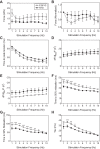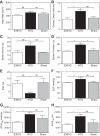A dilated cardiomyopathy mutation blunts adrenergic response and induces contractile dysfunction under chronic angiotensin II stress
- PMID: 26432839
- PMCID: PMC4698377
- DOI: 10.1152/ajpheart.00327.2015
A dilated cardiomyopathy mutation blunts adrenergic response and induces contractile dysfunction under chronic angiotensin II stress
Abstract
We investigated cardiac contractility in the ACTC E361G transgenic mouse model of dilated cardiomyopathy (DCM). No differences in cardiac dimensions or systolic function were observed in young mice, whereas young adult mice exhibited only mild diastolic abnormalities. Dobutamine had an inotropic and lusitropic effect on the mouse heart. In papillary muscle at 37°C, dobutamine increased relaxation rates [∼50% increase of peak rate of force decline normalized to force (dF/dtmin/F), 25% reduction of time to 90% relaxation (t90) in nontransgenic (NTG) mice], but in the ACTC E361G mouse, dF/dtmin/F was increased 20-30%, and t90 was only reduced 10% at 10 Hz. Pressure-volume measurements showed increases in maximum rate of pressure decline and decreases in time constant of left ventricular pressure decay in the ACTC E361G mouse that were 25-30% of the changes in the NTG mouse, consistent with blunting of the lusitropic response. The inotropic effect of dobutamine was also blunted in ACTC E361G mice, and the dobutamine-stimulated increase in cardiac output (CO) was reduced from 2,100 to 900 μl/min. Mice were treated with high doses of ANG II for 4 wk. The chronic stress treatment evoked systolic dysfunction in ACTC E361G mice but not in NTG. There was a significant reduction in rates of pressure increase and decrease, as well as reduced end-systolic pressure and increased volume. Ejection fraction and CO were reduced in the ACTC E361G mouse, indicating DCM. In vitro DCM-causing mutations uncouple the relationship between Ca(2+) sensitivity and troponin I phosphorylation. We conclude that this leads to the observed, reduced response to β1 agonists and reduced cardiac reserve that predisposes the heart to DCM under conditions of chronic stress.
Keywords: angiotensin II stress; dilated cardiomyopathy; dobutamine; heart muscle contractility.
Copyright © 2015 the American Physiological Society.
Figures





References
-
- Barrick CJ, Rojas M, Schoonhoven R, Smyth SS, Threadgill DW. Cardiac response to pressure overload in 129S1/SvImJ and C57BL/6J mice: temporal- and background-dependent development of concentric left ventricular hypertrophy. Am J Physiol Heart Circ Physiol 292: H2119–H2130, 2007. - PubMed
-
- Biesiadecki BJ, Kobayashi T, Walker JS, John Solaro R, de Tombe PP. The troponin C G159D mutation blunts myofilament desensitization induced by troponin I Ser23/24 phosphorylation. Circ Res 100: 1486–1493, 2007. - PubMed
-
- Chang AN, Potter JD. Sarcomeric protein mutations in dilated cardiomyopathy. Heart Fail Rev 10: 225–235, 2005. - PubMed
-
- Copeland O, Nowak K, Laing N, Ravenscroft G, Messer AE, Bayliss CR, Marston SB. Investigation of changes in skeletal muscle alpha-actin expression in normal and pathological human and mouse hearts. J Muscle Res Cell Motil 31: 207–214, 2010. - PubMed
-
- Du CK, Morimoto S, Nishii K, Minakami R, Ohta M, Tadano N, Lu QW, Wang YY, Zhan DY, Mochizuki M, Kita S, Miwa Y, Takahashi-Yanaga F, Iwamoto T, Ohtsuki I, Sasaguri T. Knock-in mouse model of dilated cardiomyopathy caused by troponin mutation. Circ Res 101: 185–194, 2007. - PubMed
Publication types
MeSH terms
Substances
Grants and funding
LinkOut - more resources
Full Text Sources
Other Literature Sources
Molecular Biology Databases
Miscellaneous

